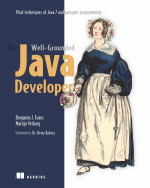The idea for my last blog post (my ten favorite online resources for advanced Java developers), was inspired by the Xiaoran Wang post Top 10 Websites for Advanced Level Java Developers. Wang also wrote a post called Top 10 Books For Advanced Level Java Developers. As with the post on best websites for advanced Java developers, it is easy to see why Wang listed the ten books he did list. In this post, I look at my top ten list which includes many of the same books as on his list, but my list has a few that are different.
There are numerous good (and some not so good) books aimed at beginning Java developers. However, it seems far more difficult to find good Java books for intermediate and advanced developers. There are plenty of books that provide in-depth coverage on very narrow topics and so are suitable for advanced Java developers, but there seems to be few "more general" Java books aimed at advanced developers.
5. Java Generics and Collections
4. Java Performance

3. The Well-Grounded Java Developer

2. Java Concurrency in Practice
1. Effective Java

Honorable Mention
There are other books that could have made this list and most of us probably have different takes on what are advanced Java books. For me, an "advanced Java developer" is a Java developer with significant depth of knowledge, significant breadth of knowledge, awareness of new and upcoming features of Java, and awareness of tools and products in the Java community that aid the entire Java development lifecycle. Effective Unit Testing and Java Power Tools are two books that are not on advanced subjects, but are books that I think contain information that can help a Java developer move from being a beginner to an intermediate or advanced Java developer. In particular, Effective Unit Testing can help Java developers write better and more efficient unit tests and Java Power Tools helps Java developers increase their breadth of knowledge key open source tools that can be used in all phases of Java development. Beginning Java developers tend not to have the unit testing experience that is contained in Effective Unit Testing and generally lack knowledge of the products available to the Java developer as outlined in Java Power Tools.
ConclusionIt is my belief that it is difficult to write and publish an advanced Java book. Writing an advanced Java books requires the author(s) to have deep understanding of the topic being written about and it is likely that publishers generally sell far more introductory books than advanced books. The barrier to entry seems much higher for writing and publishing advanced Java books as compared to writing and publishing entry-level Java books. Online resources in many ways seem better suited for satisfying advanced Java developers, but the five books I listed in this post buck that trend and provide a level of detailed and thorough information unmatched in the online resources in terms of accessibility and cohesiveness. The books in this list are useful to advanced Java developers, but are probably most useful in helping Java developers to become advanced Java developers.
1 comment:
A list similar to mine in this blog post has since been posted: Top 10 Books For Advanced Level Java Developers.
Post a Comment